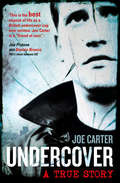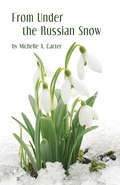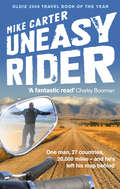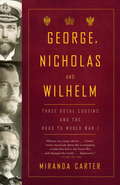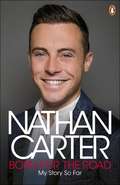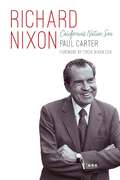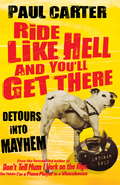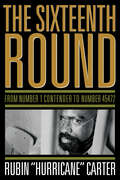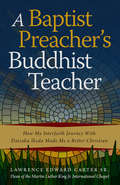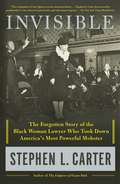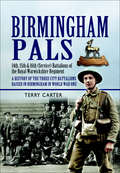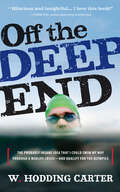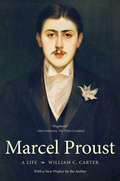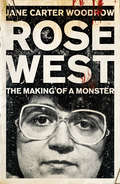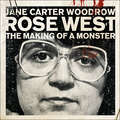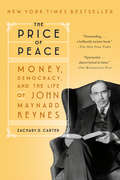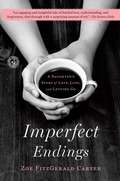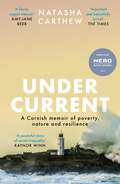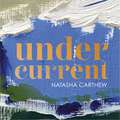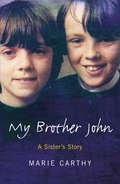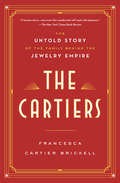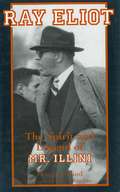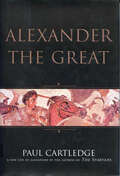- Table View
- List View
Undercover
by Joe CarterA compelling true story of the reality of undercover police workFor over 20 years, Joe Carter has worked for the police as an undercover cop. Travelling the globe on different passports, fraternising with thieves and international drugs and arms dealers, working alongside dangerous criminals, Carter always knew his life would come crashing down around him at any point. His story is a gripping account of the secret, solitary work of an undercover officer and the many ‘sticky’ situations he found himself in, as well as the moving confession of the difficulty in reconciling his two identities with his family life.This book explores the resilience needed to lead a double life, the thrilling challenge of working with the biggest criminals in Britain, and maintaining a sense of justice through the many adventures he encounters.
From Under the Russian Snow
by Michelle A CarterAt age 50, Michelle Carter, a married mother of two adult children, left her job as editor of a suburban newspaper in the San Francisco Bay area to move to Russia for a year as a United States Information Agency Journalist-in-Residence. There she worked with newspaper editors who struggled to adapt to the new concepts of press freedom and a market economy. She became an on-the-scene witness to the second great Russian revolution. At the same time, she embarked on a personal journey that wrenched her life in a way she could never have anticipated when she accepted her husband's challenge to take the assignment.
Uneasy Rider: Travels Through a Mid-Life Crisis
by Mike CarterA broken heart and a moment of drunken bravado inspires middle-aged, and typically rather cautious, journalist Mike Carter to take off on a life-changing six month motorcycle trip around Europe. Never mind that he hadn't been on two wheels since an inglorious three-month teenage chapter involving a Lambretta, four crashes and an 18-month ban for drink-driving, a plan had begun to loosely form...And so, having completed a six day residential motorcycle course and hastily re-mortgaged his flat, Mike sets off alone, resolving to go wherever the road takes him and enjoy the adventure of heading off into the unknown. He ends up travelling almost 20,000 miles and reaching the four extremes of Europe: the Arctic Circle in the north, the Mediterranean coast in the south, the Portuguese Atlantic to the west and the Iraqi border of Turkey in the east.But really it's a journey inwards, as, on the way, Mike finds his post-divorce scars starting to heal and attempts to discover what he, as a man in his forties who hasn't quite found his place in the world, should be doing. Self-deprecating, poetic and utterly engaging, his is a heroic journey taken for the rest of us too scared to leave our 9 to 5 office-bound existence.
George, Nicholas and Wilhelm: Three Royal Cousins and the Road to World War I
by Miranda CarterIn the years before the First World War, the great European powers were ruled by three first cousins: King George V of Britain, Kaiser Wilhelm II of Germany and Tsar Nicholas II of Russia. Together, they presided over the last years of dynastic Europe and the outbreak of the most destructive war the world had ever seen, a war that set twentieth-century Europe on course to be the most violent continent in the history of the world. Miranda Carter uses the cousins’ correspondence and a host of historical sources to tell the tragicomic story of a tiny, glittering, solipsistic world that was often preposterously out of kilter with its times, struggling to stay in command of politics and world events as history overtook it. George, Nicholas and Wilhelmis a brilliant and sometimes darkly hilarious portrait of these men—damaged, egotistical Wilhelm; quiet, stubborn Nicholas; and anxious, dutiful George—and their lives, foibles and obsessions, from tantrums to uniforms to stamp collecting. It is also alive with fresh, subtle portraits of other familiar figures: Queen Victoria—grandmother to two of them, grandmother-in-law to the third—whose conservatism and bullying obsession with family left a dangerous legacy; and Edward VII, the playboy “arch-vulgarian” who turned out to have a remarkable gift for international relations and the theatrics of mass politics. At the same time, Carter weaves through their stories a riveting account of the events that led to World War I, showing how the personal and the political interacted, sometimes to devastating effect. For all three men the war would be a disaster that destroyed forever the illusion of their close family relationships, with any sense of peace and harmony shattered in a final coda of murder, betrayal and abdication.
Born for the Road: My Story So Far
by Nathan CarterNathan Carter has become Ireland's biggest country music star. He is heralded by many as reviving the country music genre and bringing it into the mainstream. He has sold out venues across the UK and Ireland, has landed his own primetime show, and is loved and respected by legions of fans across Ireland.But how did a lad from Liverpool accomplish all this before the age of 27?In his revealing and inspirational autobiography, Nathan reminisces about his music filled childhood, and growing up in Merseyside with his Liverpool-Irish family. From his first taste of showbiz at the tender age of four, to his success on the north of England club circuit and his subsequent relocation to Donegal, Nathan explores the twists of fate that took him to chart success and to become Ireland's adopted poster boy for country music.
Richard Nixon: California's Native Son
by Paul CarterModern biographies of Richard Nixon have been consumed with Watergate. All have missed arguably the most important perspective on Nixon as California&’s native son, the only U.S. president born and raised in California. In addition, Nixon was also a son, brother, friend, husband, father, uncle, and grandfather. By shifting the focus from Watergate and Washington to Nixon&’s deep, defining roots in California, Paul Carter boldly challenges common conceptions of the thirty-seventh president of the United States. More biographies have been written on Nixon than any other U.S. politician. Yet the territory traversed by Carter is unexplored, revealing for the first time the people, places, and experiences that shaped Richard Nixon and the qualities that garnered him respect from those who knew him well. Born in Yorba Linda and raised in Whittier, California, Nixon succeeded early in life, excelling in academics while enjoying athletics through high school. At Whittier College he graduated at the top of his class and was voted Best Man on Campus. During his career at Whittier&’s oldest law firm, he was respected professionally and became a chief trial attorney. As a military man in the South Pacific during World War II, he was admired by his fellow servicemen. Returning to his Quaker roots after the war, he was elected to the U.S. House of Representatives, the Senate, and the vice presidency, all within six short years. After losing to John Kennedy in the 1960 presidential campaign, Nixon returned to Southern California to practice law. After losing his gubernatorial race he reinvented himself: he moved to New York and was elected president of the United States in 1968. He returned to Southern California after Watergate and his resignation to heal before once again taking a place on the world stage.Richard Nixon: California&’s Native Son is the story of Nixon&’s Southern California journey from his birth in Yorba Linda to his final resting place just a few yards from the home in which he was born.
Ride Like Hell and You'll Get There: Detours into mayhem
by Paul CarterATTEMPTING 300KPH on an untested experimental motorcycle could be considered a perfect way to kill yourself, but Paul Carter is still, well, PAUL CARTER and danger at high speed is his second name. Whether discovering that being dyslexic means delivering your lines to camera back to front in the midst of filming a TV series, or starting a new business and travelling the world, or dealing with life's more sober moments like the birth of a son or the loss of a father, Paul Carter is still the funniest man in the bar and the nicest 'alpha male' you'll ever meet as he risks all for the sake of a cracking yarn. SO STRAP YOURSELF IN and HOLD ON TIGHT for his FOURTH BOOK - we just have to hope that he won't be institutionalised before completing his fifth!
The Sixteenth Round: From Number 1 Contender to Number 45472
by Rubin CarterThe survivor of a difficult childhood and youth, Rubin Carter rose to become a top contender for the middleweight boxing crown. But his career crashed to a halt on May 26, 1967, when he and another man were found guilty of the murder of three white people in a New Jersey bar. While in prison, Carter chronicled the events that led him from the ring to three consecutive life sentences and 10 years in solitary confinement. His story was a cry for help to the public, an attempt to set the record straight and force a new trial. Bob Dylan wrote a classic anthem for Carter's struggle; and Joan Baez, Muhammad Ali, Roberta Flack, and thousands more took up the cause as well. Originally published in 1974, this account is an eye-opening examination of growing up black in America, problems in the United States prison system, and Carter's own battles.
A Baptist Preacher's Buddhist Teacher: How My Interfaith Journey with Daisaku Ikeda Made Me a Better Christian
by Lawrence Edward Carter Sr.In this inspiring, soul-stirring memoir, Lawrence E. Carter Sr., founding dean of the Martin Luther King Jr. International Chapel, shares his remarkable quest to experience King's "beloved community" and his surprising discovery in mid-life that King's dream was being realized by the Japanese Buddhist philosopher and tireless peace worker Daisaku Ikeda. Coming of age on the cusp of the American Civil Rights Movement, Carter was personally mentored by Martin Luther King Jr. and followed in his footsteps, first to get an advanced degree in theology at Boston University and then to teach and train a new generation of activists and ministers at King's alma mater, Morehouse College. Over the years, however, Carter was disheartened to watch the radical cosmic vision at the heart of King's message gradually diluted and marginalized. He found himself in near despair—until his remarkable encounter with the lay Buddhist association Soka Gakkai International and a life-changing meeting with Ikeda, its president. Carter knew that King had been inspired by Gandhi, a Hindu, and now Ikeda, a Buddhist, was showing him how King's message of justice, equality, and the fundamental dignity of life could be carried to millions of people around the world. What ensued was not a conversion but a conversation—about the essential role of interfaith dialogue, the primacy of education, and the value of a living faith to create a human revolution and realize at last Martin Luther King's truest dream of a global world house. In these dark and frustrating times, the powerful dialogue between Carter and Ikeda gives hope and guidance to a new generation of reformers, activists, and visionaries.
Invisible: The Forgotten Story of the Black Woman Lawyer Who Took Down America's Most Powerful Mobster
by Stephen L. CarterThe bestselling author delves into his past and discovers the inspiring story of his grandmother’s extraordinary life She was black and a woman and a prosecutor, a graduate of Smith College and the granddaughter of slaves, as dazzlingly unlikely a combination as one could imagine in New York of the 1930s—and without the strategy she devised, Lucky Luciano, the most powerful Mafia boss in history, would never have been convicted. When special prosecutor Thomas E. Dewey selected twenty lawyers to help him clean up the city’s underworld, she was the only member of his team who was not a white male.Eunice Hunton Carter, Stephen Carter’s grandmother, was raised in a world of stultifying expectations about race and gender, yet by the 1940s, her professional and political successes had made her one of the most famous black women in America. But her triumphs were shadowed by prejudice and tragedy. Greatly complicating her rise was her difficult relationship with her younger brother, Alphaeus, an avowed Communist who—together with his friend Dashiell Hammett—would go to prison during the McCarthy era. Yet she remained unbowed.Moving, haunting, and as fast-paced as a novel, Invisible tells the true story of a woman who often found her path blocked by the social and political expectations of her time. But Eunice Carter never accepted defeat, and thanks to her grandson’s remarkable book, her long forgotten story is once again visible.
Birmingham Pals: 14th, 15th & 16th (Service) Battalions of the Royal Warwickshire Regiment, A History of the Three City Battalions Raised in Birmingham in World War One (Pals Ser.)
by Terry CarterIn the summer of 1914, our finest young men flocked to the colors in Northern towns and cities to answer Lord Kitcheners Call to Arms in a spontaneous burst of enthusiasm and patriotism. The Call appealed to their sense of adventure and offered an escape from the humdrum life of office, factory and mill.The new recruits volunteered with brothers, cousins, friends and work mates. The newly formed units became the focus of local civic pride and soon became known as the Pals. The City of Birmingham formed three such battalions with over 3,000 local volunteers. This book tells their story.Birmingham Pals is a story that covers the full range of human experience in war—the highest courage and bravery, the misery and tedium of trench life, the exhilaration, terror and slaughter involved in going over the top. Above all, it is a story of interest to people of all backgrounds and ages, as a tale of comradeship, which, for many survivors, was to last a life time.
Orpheus in the Marketplace
by Tim Carter Richard A. GoldthwaiteThe Florentine musician Jacopo Peri (1561-1633) is known as the composer of the first operas--they include the earliest to survive complete, Euridice (1600), in which Peri sang the role of Orpheus. The recent discovery of a large number of private account books belonging to him and his family allows for a greater exploration of Peri's professional and personal life. Richard Goldthwaite, an economic historian, and Tim Carter, a musicologist, have done more, however, than write a biography: their investigation exposes the value of such financial documents as a primary source for an entire period. This record of Peri's wide-ranging investments and activities in the marketplace enables the first detailed account of the Florentine economy in the late sixteenth and early seventeenth centuries, and opens a new perspective on one of Europe's principal centers of capitalism. His economic circumstances reflect continuities and transformations in Florentine society, and the strategies for negotiating them, under the Medici grand dukes. They also allow a reevaluation of Peri the singer and composer that elucidates the cultural life of a major artistic center even in changing times, providing a quite different view of what it meant to be a musician in late Renaissance Italy.
Off the Deep End: The Probably Insane Idea That I Could Swim My Way Through A Midlife Crisis - And Qualify For The Olympics
by W. Hodding CarterHodding Carter dreamed of being an Olympian as a kid. He worshipped Mark Spitz, swam his heart out, and just missed qualifying for the Olympic trials in swimming as a college senior. Although he didn't qualify for the 1976, 1980, 1984, 1988, 1992, 1996, 2000, or 2004 Olympics, he never stopped believing he could make it. And despite past failures and the passage of time, Carter began his quest once more at the age of forty-two. Maybe he's crazy. But then again, maybe he's onto something. He entered the Masters Championships. He swam three to four miles each day, six days a week. He pumped iron, trained with former Olympians, and consulted with swimming gurus and medical researchers who taught him that the body doesn't have to age. He swam with sharks (inadvertently) in the Virgin Islands, suffered hypothermia in a relay around Manhattan, and put on fifteen pounds of muscle. Amazingly, he discovered that his heartbeat could keep pace with the best of the younger swimmers'. And each day he felt stronger, swam faster, and became more convinced that he wasn't crazy. This outrageous, courageous chronicle is much more than Carter's race with time to make it to the Olympics. It's the exhilarating story of a man who rebels against middle age the only way he can—by chasing a dream. His article in Outside magazine, on which this book is based, was the winner of a Lowell Thomas award from the Society of American Travel Writers Foundation.
Marcel Proust
by William C. CarterThis outstanding biography portrays in abundant detail the life and extraordinary times of Marcel Proust, one of the greatest literary voiced of the twentieth century. Based on a wealth of letters, memoirs, workbooks, and manuscripts unavailable before, the book examines Proust's character and development as an artist, the glittering Parisian world of which he was a part, and the passions that enabled him to write his masterpiece, In Search of Lost Time. Book jacket.
ROSE WEST: The Making of a Monster
by Jane Carter WoodrowHard to believe it looking at her now, but Rose West was an exceptionally beautiful little girl, with a Maltese mother and English father. Strangers would stop and stare at her in the street and she could entrance people from a very early age. But looking back at photos of Rose as a child, you struggle to accept that she grew up to one of the country's most notorious female criminals.In ROSE, Jane Carter Woodrow goes right back to the start in her life to try and piece together what happened to turn Rose West into the violent monster she became. Jane has gained unprecedented access to the family and has revealed a fascinating story of how there was always something 'not quite right' about Rose...And perhaps that's not too surprising... Rose's childhood reads like one of the most grim misery memoirs. Her father was a violent schizophrenic and her mother received electric shock therapy for severe clinical depression, the whole way through her pregnancy with Rose. Jane has uncovered a horrific hidden story of a twisted family and how her upbringing made her a perfect partner for Fred West when they met when Rose had just turned 16. She was to kill for the first time a few months later.This is a gripping, unputdownable read that sheds light for the first time on the story behind what turned Rose West into one of the country's most vicious and deadly serial killers.
ROSE WEST: The Making of a Monster
by Jane Carter WoodrowJane Carter Woodrow goes right back to the start of the infamous serial killer Rose West's life, to try and piece together what happened to turn her into the violent monster she became. A gripping listen on the real story of Rose West who, together with her husband Fred West, became Britain's biggest and most notorious murderers.***As seen on the Channel 5 documentary Making a Monster***Although it's hard to believe now, Rose West was an exceptionally beautiful little girl with long, glossy dark hair and big brown eyes. Looking at photos of young Rosie as a child, it is almost impossible to comprehend that she would grow up to become one of Britain's most notorious female murderers. But Rose's early life made her the perfect partner for Fred West, and the two committed a string of murders in Gloucester throughout the seventies and eighties. Her part in the killings is very different to that which many people believe even today.What happened to that little girl to make her capable of such violence? Or was there something wrong - a predisposition to cruelty - which she was born with?Crime writer Jane Carter Woodrow goes back to the start of Rose's life to piece together what it was that turned her into a monster. In doing so, she presents us with a profile of the young Rose West and a fascinating insight into the mind of a killer.ROSE WEST is a gripping listen which sheds light for the first time on the real story of Rose West - taking the listener on a journey from her childhood through to her becoming the country's biggest and most infamous female sexual predator and serial killer.(P) 2021 Hodder & Stoughton Limited
The Price of Peace: Money, Democracy, and the Life of John Maynard Keynes
by Zachary D. Carter&“An important, resonant, and memorable portrait&” (Jon Meacham) of world-changing economist John Maynard Keynes and the transformative ideas that outlived him &“A brilliantly wrought, beautifully written life of one of the most captivating intellects of the twentieth century.&”—Liaquat Ahamed, author of Lords of Finance At the dawn of World War I, a young academic named John Maynard Keynes hastily folded his long legs into the sidecar of his brother-in-law&’s motorcycle for an odd, frantic journey that would change the course of history. Swept away from his placid home at Cambridge University by the currents of the conflict, Keynes found himself thrust into the halls of European treasuries to arrange emergency loans and packed off to America to negotiate the terms of economic combat. The terror and anxiety unleashed by the war would transform him from a comfortable obscurity into the most influential and controversial intellectual of his day—a man whose ideas still retain the power to shock in our own time.Keynes was not only an economist but the preeminent anti-authoritarian thinker of the twentieth century, one who devoted his life to the belief that art and ideas could conquer war and deprivation. As a moral philosopher, political theorist, and statesman, Keynes led an extraordinary life that took him from intimate turn-of-the-century parties in London&’s riotous Bloomsbury art scene to the fevered negotiations in Paris that shaped the Treaty of Versailles, from stock market crashes on two continents to diplomatic breakthroughs in the mountains of New Hampshire to wartime ballet openings at London&’s extravagant Covent Garden. Along the way, Keynes reinvented Enlightenment liberalism to meet the harrowing crises of the twentieth century. In the United States, his ideas became the foundation of a burgeoning economics profession, but they also became a flash point in the broader political struggle of the Cold War, as Keynesian acolytes faced off against conservatives in an intellectual battle for the future of the country—and the world. Though many Keynesian ideas survived the struggle, much of the project to which he devoted his life was lost. In this riveting biography, veteran journalist Zachary D. Carter unearths the lost legacy of one of history&’s most fascinating minds. The Price of Peace revives a forgotten set of ideas about democracy, money, and the good life with transformative implications for today&’s debates over inequality and the power politics that shape the global order.
Imperfect Endings
by Zoe Fitzgerald CarterZoe Carter's busy life on the West Coast with her husband and daughters takes an unexpected detour when her glamorous, independent-minded mother, Margaret, tired of living with Parkinson's disease, decides she wants to "end things." As Zoe and her sisters negotiate over whether or not they should support Margaret's choice and who should be there at the end, their discussions stir up old alliances and animosities, along with memories of a childhood dominated by their elegant mother and philandering father. Capturing the stresses and the joys of the "sandwich generation" while bringing a provocative new perspective to the assisted suicide debate, Imperfect Endings is the uplifting story of a woman determined to die on her own terms and the family who has to learn to let her go.
Undercurrent: A Cornish Memoir of Poverty, Nature and Resilience
by Natasha Carthew'At times roaring and visceral, in turn gentle and embracing, always driven by hope and determination' RAYNOR WINN 'Haunting and powerful' KATE MOSSE To grow up in rural poverty is to fight for life before you can walk.Natasha Carthew was born into a world that sat alongside picture-postcard Cornwall, one where second homes took the sea view of council properties, summer months shifted the course of people's lives, and wealth converged with poverty on sandy beaches.In the rockpools and hedgerows of the natural world, Natasha found solace in the beauty of the landscape, and in the mobile library she found her means of escape. In Undercurrent she returns to the cliff paths of her childhood, determined to make sense of an upbringing shaped by political neglect and a life defined by the beauty of nature.This is a journey through place, and a vivid story of hope, beauty and fierce resilience.'Marvellous, moving and mesmerising' ANITA SETHI 'A story of queer resistance, of community and of finding your own voice' DAMIAN BARR
Undercurrent: A Cornish Memoir of Poverty, Nature and Resilience
by Natasha CarthewThere's a Cornish saying that nothing is left behind in an autumnal tide, the powerful tug between the sun and the equator makes the water surface stronger, and it pulls and builds until we are left with what is known as great tides - but as I stand here on my childhood beach someplace in my 40s, all I can see is the stretch of grey rocks and sand where the ebb has come and gone.Natasha Carthew grew up in rural poverty in Cornwall, battling limited opportunities, precarious resources, escalating property prices, isolation and a community marked by the ravages of inequality. Her world existed alongside the postcard picture Cornwall, where wealth and privilege converged on sandy beaches and expensive second homes.In the rockpools and hedgerows of the natural world, Natasha found solace in the beauty of the landscape, and in the mobile library she found her means of escape. In her first non-fiction audiobook she returns to the cliff-paths of her childhood, determined to make sense of an upbringing shaped by political neglect and a life defined by the beauty of nature.Undercurrent is part-memoir, part-investigation, part love-letter to Cornwall. It is a vivid, powerful exploration of rural poverty, and the often devastating impact of living without the means or support to build a future. This is a journey through place, and a story of hope, beauty, and fierce resilience.(P) 2023 Hodder & Stoughton Limited
My Brother John: The Abbeylara story of depression, loss and a sister's quest for justice
by Marie CarthyJohn Carthy was an average guy, a hard-working young man devoted to his mother and sister, who also happened to suffer from depression - in common with one in four Irish people today. But in April 2001, in the grip of a bi-polar episode, John was shot dead by gardai after emerging from his home in Abbeylara after a 25-hour stand-off. It was a shooting that could have been avoided. What had begun as a private family happening in a small Irish town had quickly turned into a national media event, with journalists given more access to the scene than ultimately even his own sister was allowed. In the wake of his death Marie Carthy fought relentlessly for an independent inquiry into her brother's shooting, withstanding personal humiliation and attempts to discredit her along the way. Six years on she and her mother Rose found themselves vindicated by the findings of the Barr Tribunal. Yet nothing can ever bring John back. My Brother John is a tribute to a beloved brother and son. From their carefree childhood as inseparable siblings to the untimely death of their father when they were teenagers, it describes the onset of John's depression and how he learned to cope with his illness. It also tells the family's story in the grim aftermath of his death, and how their pledge for justice in his name kept them fighting throughout the darkest of days.
My Brother John: The Abbeylara story of depression, loss and a sister's quest for justice
by Marie CarthyJohn Carthy was an average guy, a hard-working young man devoted to his mother and sister, who also happened to suffer from depression - in common with one in four Irish people today. But in April 2001, in the grip of a bi-polar episode, John was shot dead by gardai after emerging from his home in Abbeylara after a 25-hour stand-off. It was a shooting that could have been avoided. What had begun as a private family happening in a small Irish town had quickly turned into a national media event, with journalists given more access to the scene than ultimately even his own sister was allowed. In the wake of his death Marie Carthy fought relentlessly for an independent inquiry into her brother's shooting, withstanding personal humiliation and attempts to discredit her along the way. Six years on she and her mother Rose found themselves vindicated by the findings of the Barr Tribunal. Yet nothing can ever bring John back. My Brother John is a tribute to a beloved brother and son. From their carefree childhood as inseparable siblings to the untimely death of their father when they were teenagers, it describes the onset of John's depression and how he learned to cope with his illness. It also tells the family's story in the grim aftermath of his death, and how their pledge for justice in his name kept them fighting throughout the darkest of days.
The Cartiers: The Untold Story of the Family Behind the Jewelry Empire
by Francesca Cartier Brickell&“An enchanting jewel of a book.&”—Douglas Smith, author of Former People: The Final Days of the Russian Aristocracy The captivating story of the family behind the Cartier empire and the three brothers who turned their grandfather&’s humble Parisian jewelry store into a global luxury icon—as told by a great-granddaughter with exclusive access to long-lost family archives The Cartiers is the revealing tale of a jewelry dynasty—four generations, from revolutionary France to the 1970s. At its heart are the three Cartier brothers whose motto was &“Never copy, only create&” and who made their family firm internationally famous in the early days of the twentieth century, thanks to their unique and complementary talents: Louis, the visionary designer who created the first men&’s wristwatch to help an aviator friend tell the time without taking his hands off the controls of his flying machine; Pierre, the master dealmaker who bought the New York headquarters on Fifth Avenue for a double-stranded natural pearl necklace; and Jacques, the globe-trotting gemstone expert whose travels to India gave Cartier access to the world&’s best rubies, emeralds, and sapphires, inspiring the celebrated Tutti Frutti jewelry. Francesca Cartier Brickell, whose great-grandfather was the youngest of the brothers, has traveled the world researching her family&’s history, tracking down those connected with her ancestors and discovering long-lost pieces of the puzzle along the way. Now she reveals never-before-told dramas, romances, intrigues, betrayals, and more. The Cartiers also offers a behind-the-scenes look at the firm&’s most iconic jewelry—the notoriously cursed Hope Diamond, the Romanov emeralds, the classic panther pieces—and the long line of stars from the worlds of fashion, film, and royalty who wore them, from Indian maharajas and Russian grand duchesses to Wallis Simpson, Coco Chanel, and Elizabeth Taylor. Published in the two-hundredth anniversary year of the birth of the dynasty&’s founder, Louis-François Cartier, this book is a magnificent, definitive, epic social history shown through the deeply personal lens of one legendary family.
Ray Eliot: The Spirit and Legend of Mr. Illini
by Doug CartlandThis biography of legendary University of Illinois coach Ray Eliot describes a man who loved football and motivating his team. Doug Cartland, writes of his grandfather's life as one to admire, to learn from, and to be inspired by.
Alexander the Great: A New Life of Alexander
by Paul CartledgePaul Cartledge, one of the world’s foremost scholars of ancient Greece, illuminates the brief but iconic life of Alexander (356-323 BC), king of Macedon, conqueror of the Persian Empire, and founder of a new world order. Alexander's legacy has had a major impact on military tacticians, scholars, statesmen, adventurers, authors, and filmmakers. Cartledge brilliantly evokes Alexander's remarkable political and military accomplishments, cutting through the myths to show why he was such a great leader. He explores our endless fascination with Alexander and gives us insight into his charismatic leadership, his capacity for brutality, and his sophisticated grasp of international politics. Alexander the Great is an engaging portrait of a fascinating man, and a welcome balance to the myths, legends, and often skewed history that have obscured the real Alexander.
